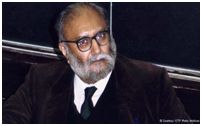
 Pakistan remains silent about its only Nobel Laureate Abdus Salam and his contribution to the recent discovery of the ‘God particle’ because the late scientist belonged to the ‘heretic’ Ahmadiyya sect.
Pakistan remains silent about its only Nobel Laureate Abdus Salam and his contribution to the recent discovery of the ‘God particle’ because the late scientist belonged to the ‘heretic’ Ahmadiyya sect.
Internationally, Professor Abdus Salam is known for his outstanding contribution to Physics and his groundbreaking work that led to the discovery of the so-called God Particle, but in Pakistan, where the late Nobel Laureate was born, Dr. Salam is a heretic, whose name has been removed from all text books.
Salam’s crime was that despite being a genius in the field of science, he was a member of the Ahmadiyya minority. The sect was declared non-Muslims by the Pakistani legislators in the 1973 constitution as part of its Islamization process. Thus, Pakistan disowned its only Nobel laureate.
Salam did initial work on particle physics that contributed to the Higgs boson discovery “The Pakistani right wing is silent about Salam and the Higgs boson connection because it believes the discovery would support the scientist and the Ahmadiyyas,” Amin Mughal, a London-based scholar, told DW.
Constitutional discrimination
The Islamization of Pakistan, which began during former Prime Minister Zulfiqar Ali Bhutto’s government in the 1970s, culminated in the 1980s under the former military dictator General Zia-ul-Haq’s Islamist regime. It was during Haq’s oppressive rule when Ahmadiyyas (also known as Qadianis in Pakistan) were banned from calling themselves Muslim and building their mosques in the Islamic Republic. Their places of worship were shut down or desecrated by hard-line Islamist with the support of the state.
Ahmadiyyas, who believe the messiah Ghulam Ahmed lived after the Prophet Muhammad, insist they are Muslim and demand as much right to practice their faith in Pakistan as other people.
Islam determines most things in Pakistan
Baseer Naveed, senior researcher at the Asian Human Rights Commission in Hong Kong, told DW that the Pakistani state did not want to upset the fundamentalist sections of society by associating itself with an Ahmadiyya scientist.
“It is to appease Muslim fundamentalists and right wing parties. More so, it is to appease Saudi Arabia. The Pakistani state is more interested in carrying on with its policy of hatred rather than taking pride in Abdus Salam’s contributions,” said Naveed.
However, Mughal believes the issue is more political than religious.
“Until recently, Ahmadis were a relatively strong group within the Pakistani establishment. The dominant Sunni groups felt threatened by them and axed them out of the state affairs,” said Mughal.
‘The Islamic bomb’
Naveed pointed out that it seemed impossible for academics, scientists, writers and researchers to be declared national heroes in Pakistan.
“Only warriors and usurpers are glorified,” said Naveed.
Dr. Khan is a hero for many Pakistanis
Pakistan’s “science hero” happens to be the infamous Dr. Abdul Qadeer Khan, the father of Pakistan’s atomic bomb – referred to by Pakistani right-wing groups as the “Islamic bomb.”
In 2004, Khan publicly confessed that he transferred the nuclear technology to countries like Iran and North Korea. Though the notorious scientist was put under house arrest by former military dictator Pervez Musharraf, Khan is still hailed by the many in Pakistan as country’s ‘savior.’
Pakistan’s liberal scholars say that the state takes more pride in and invests more money in developing missiles and nuclear warheads than in promoting actual scientific research.
“Research in scientific development has almost stopped in the country,” said Naveed, adding that only jihadist ideas and teachings are flourishing in Pakistan. “Most researchers from minority religious sects have already left the country, and those who are still in Pakistan are worried about their lives,” he said.
To support this case, please click here: SEND APPEAL LETTER
SAMPLE LETTER